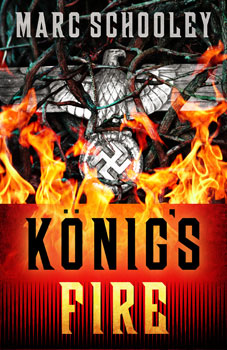‘König’s Fire’ Blazes With Dark Beauties and Truths
Last year, König’s Fire by Marc Schooley kept me up until at least 2 a.m., forging fast to the story’s end. Even especially great fiction doesn’t usually do that to me. Moreover, I am not known to enjoy novels featuring zombie-like plant-monsters, paranormal horror, and great evils. You likely aren’t either. But this story changed that for me and it may also change you.
If nothing else, you, like me, may never think of Romans 8: 19-22 the same way again.
This is a novel for mature readers who can imagine the worst and creepiest horrors, but not fall into temptations to dwell on them in ways that dismiss God’s sovereignty over evil. Thinking teens could read it. But be aware: this isn’t edgy-for-the-sake-of-edge. Despite the story’s great evil, it ends in light, not darkness. Again I feel chills just thinking about it.
1. Hero and plot. In a Nazi prison mine surrounded by a besieging, organic army, Sascha König, a German soldier, arrives with orders to heat the mine’s furnace seven times hotter. His superior, Colonel Hayner, is determined on using the furnace to kill “inferior” people.
Here is historical truth, raw and terrible. Schooley doesn’t shy from showing it. Yet before long the historical gives way to the paranormal: something is attacking the mine, from without and within. To say more about that would be a crime. So would be saying more about König himself. Early on we receive hints about him — that despite his profession, he will be no antihero. This light stands out even more against the story’s black backdrop.
God is reflected, certainly with human flaws, by the novel’s human hero. God’s sovereignty, truth, and beauty are implicit when needed, and explicit at exactly the right times. And the story, as I said before, shows the darkness of humanity at its worst — more Biblical truth.
2. Enemies and characters. Hayner and other German officers are plainly evil and shown as such, though Schooley never lapses into stereotypes. Their heat stays on. This is another element that kept me reading late into the night: the enemies’ constant threat. To say more would yield more spoilers. Yet I can say this much: unlike other novels, the reader — and characters — recognizes how much he himself is part of the enemy. Only mercy prevents their, and our, just fate at the hand of God, and just consequences at the “hand” of Another.
All throughout, I was inwardly rooting for König’s Fire’s supporting heroes. Though I need to re-read the novel, a year later I vividly recall names, backstories, impressions, seemingly conveyed directly into my imagination. The story never needs to pause for info-dumping. Everyone feels real — just as real as the dark, musty, evil atmosphere of the mine.
3. Story-world and style. König’s Fire never rings false. From what I can tell, Schooley has done his research on German culture and language. Authenticity matters when this world of symbolism, paranormalcy, and horror crosses over into historical events. Moreover, one theme, central to the story, sounds even better when phrased in Latin:
Deus et natua non faciunt frusta. […] “God and nature do not work together in vain.”
Schooley’s descriptions draw you in; I felt no choice but to keep reading. And the author’s pace, while pulsing up and down like the best dark-majestic music, is nearly addictive.
Visions spiritually source the real world’s events, with original imagery that never feels forced. Despite the story summary’s overt reference to Nebuchadnezzar, Biblical parallels, especially because they are explained by an unlikely source, are genuinely surprising. And Schooley has in mind an entirely alternate story rather than a retelling based on Daniel.
Summary. I love all of Marcher Lord Press’s repertoire, yet König’s Fire must rank among my favorites. This is not because I’m inherently drawn to paranormal tales with zombie-like plant-men, either. Perhaps its themes resonated more with me. Perhaps I was dealing with life struggles at the time. Perhaps it’s because one of my favorite Biblical truths is that of restoration — and that we often treat creation as the problem, and man the victim. Yet themes aside, König’s Fire is a deceptively simple, God-exalting story. And I groan for more.



































